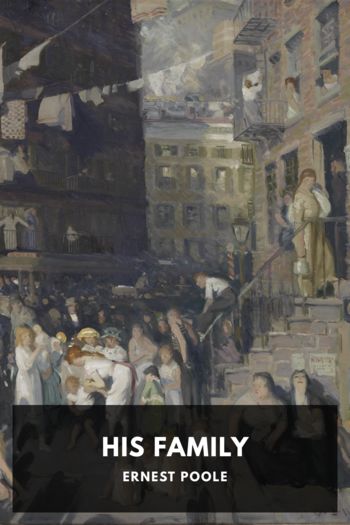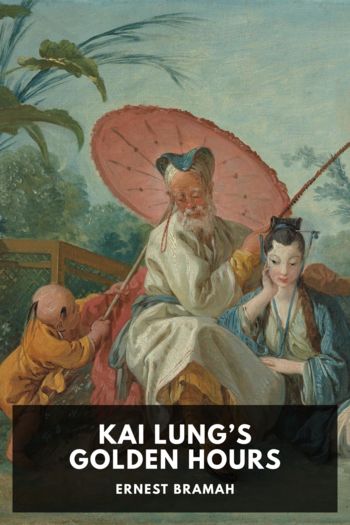His Family - Ernest Poole (ereader for comics .txt) 📗

- Author: Ernest Poole
Book online «His Family - Ernest Poole (ereader for comics .txt) 📗». Author Ernest Poole
“I don’t care,” he answered doggedly. “She has told about Paris lots of times—and that was what you wanted. Yes, you did. You said, ‘About Paris.’ Didn’t she, Bob?”
“You bet she did,” young Bob agreed.
“Now, children, children, what does it matter?”
“All right, go ahead with your barn in France,” said George with patient tolerance. “Did they have any Holsteins?”
Soon the questions were popping from every side, while little Tad beamed from one to the other. To Tad it was all so wonderful, to be having supper away from home, to be here, to go to bed upstairs, to take part perhaps in a pillow fight. … And glancing at the glowing face and the parted lips of his small grandson Roger felt a current of warm new life pour into his soul.
Early in the evening he went up to Edith’s apartment. He found his daughter in her room, looking flushed and very tense. He took her arm and they walked for a time. A trained nurse was soaping the windows. Roger asked the reason for this and was told that in case the baby did not come till morning the doctor wanted to pull up the shades in order to work by daylight. “And neighbors in New York are such cats! You’ve no idea!” said Edith. She looked out at the numberless windows crowding close about her home, and she fairly bristled with scorn. “Oh, how I loathe apartments!”
“They seem to have come to stay, my dear. In a few years more New York will be a city without a house,” he said. “Only a palace here and there.” The thought flashed in his mind, “But I shall be gone.”
“Then we’ll move out to the country!” she cried. Still walking the floor with her father, she talked of the perplexities which in her feverish state of mind had loomed suddenly enormous. She had planned everything so nicely for the baby to come the first of June, but now her plans were all upset. She did not want the children here, it would make too much confusion. They had much better go up to the mountains, even though George and Elizabeth lost their last few weeks at school. But who could she find to take them? Bruce was simply rushed to death with his new receivership. Laura was getting her trousseau. Deborah, said Edith, had time for nothing on earth but school.
“Suppose I take them,” Roger ventured. But she only smiled at this. “My dear,” he urged, “your nurse will be with me, and when we arrive there’s the farmer’s wife.” But Edith impatiently shook her head. Her warm bright eyes seemed to picture it all, hour by hour, day and night, her children there without her.
“You poor dear,” she told him, “you haven’t the slightest idea what it means. The summer train is not on yet, and you have to change three times on the way—with all the children—luggage, too. And there are their naps, and all their meals. You don’t arrive till late at night. No,” she decided firmly, “Bruce will simply have to go.” She drew a breath of discomfort. “You go and talk to him,” she said.
“I will, my dear.” Roger looked at his daughter in deep concern. Awkwardly his heavy hand touched her small plump shoulder, and he felt the constant quivering there. “Now, now,” he muttered, uneasily, “it’s going to be all right, you know—” And at that she gave him a rapid glance out of those warm hunted eyes, as though to ask, “What do you know of this?” And Roger flinched and turned to the door.
Bruce was working at his desk, with an old briar pipe in his teeth. He looked up with a quick nervous smile which showed his dread of the coming ordeal, but his voice had a carefully casual tone.
“Does she want me now?” he asked.
“No,” said Roger. And he told of her plan for the children. “I volunteered myself,” he added, “but she wouldn’t hear to it.”
“Oh, my God, man, you wouldn’t do,” said Bruce, in droll disparagement. “You with forty-nine bottles of pasteurized milk? Suppose you smashed one? Where’d you be? Moving our family isn’t a job; it’s a science, and I’ve got my degree.” He rose and his face softened. “Poor girl, she mustn’t worry like that. I’ll run in and tell her I’ll do it myself—just to get it off her mind.”
He went to his wife. And when he came back his dark features appeared a little more drawn.
“Poor devil,” thought Roger, “he’s scared to death—just as I used to be myself.”
“Pretty tough on a woman, isn’t it?” Bruce muttered, smiling constrainedly.
“Did Baird say everything’s going well?” Baird was Edith’s physician.
“Yes. He was here this afternoon, and he said he’d be back this evening.” Bruce stopped with a queer little scowl of suspense. “I told her I’d see to the trip with the kiddies, and it seemed to relieve her a lot.” His eye went to a pile of documents that lay on the desk before him. “It’ll play the very devil with business, taking three days off just now. But I guess I can manage it somehow—”
A muscle began to twitch on his face. He re-lit his pipe with elaborate care and looked over at Roger confidingly:
“Do you know what’s the matter with kids these days? It’s the twentieth century,” he said. “It’s a disease. It starts in their teeth. No modern girl can get married unless she has had her teeth straightened for years. Our dentist’s bill, this year alone, was over eight hundred dollars. But that isn’t all. It gets into their young intestines, God bless ’em, and makes you pasteurize all they eat. It gets into their nerves and tears ’em up, and your only chance to save ’em is school—not a common school but a ‘simple’ school, tuition four hundred dollars a year.





Comments (0)